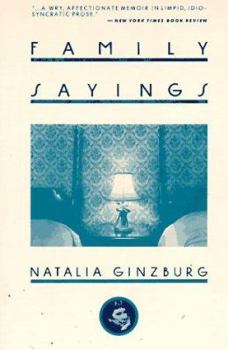Family Sayings
Select Format
Select Condition 
Book Overview
Translated from the Italian by Judith Woolf. A brilliant new translation of a classic by one of Italy's finest writers. This description may be from another edition of this product.
Format:Paperback
Language:English
ISBN:1559700270
ISBN13:9781559700276
Release Date:October 1989
Publisher:Arcade Pub
Length:181 Pages
Weight:0.56 lbs.
Dimensions:0.5" x 5.7" x 8.5"
Customer Reviews
2 ratings
A family history in hearing
Published by Thriftbooks.com User , 19 years ago
This is a very rich story of the family of Natalia Ginzburg. It is written in an unusual way. And much of the text consists in her citations of what other family members have said. It tells the story of her family in Turin, and goes up through her adult life. It is also unusual in that she does not really give her opinion of anything or anyone directly, or probe deeply into herself in any way. In the brief preface she makes it clear that she is engaged in an act of exact remembering. And she says that she has used all the names , the real names of the people in the story. The two major characters are her parents, the father who is Jewish by origin by not by religious practice, is a scientist and engineer. He is a lover of mountaineering, and a man who seems to have no idea of how to make or deal with money. He is violently opinionated, and his outbursts are one central strand in the memoir. The mother is a different soul entirely, a happy person by nature whose best friend is Ginzburg's older sister, but who brings a tone of understanding to all her five children. The story is of the five siblings also, and their eventual careers and marriages. And it is also of the extended family. And in the latter part of the book there is a lot about anti- Fascist activity of family and friends. The work has a kind of authenticity that comes not only from the ' sayings' but from its matter- of- fact descriptive and objective tone. The problem with this, and I feel with Ginzburg's voice in the work is that it is not personally deep enough, and not somehow loving enough. But again there is a texture of great richness, a feeling that what is being described is a whole world. And then too there are so many incidents and events, so many happenings that the reader has a sense of seeing life ' as it really happens'. This work gives a great deal. There is a certain sense however, and perhaps I am wrong here, of it somehow not getting to the deepest depth , of its holding aloof from where the heart is. One great example is the way Ginzburg talks of her first husband. She speaks of him as if he were just another character in the whole story. Nonetheless the reader of this review should know that my review does not begin to touch upon the many characters, events and true complexity of the work. This is a worthwhile and meaningful book. I highly recommend it.
Ginzburg's Lessico famigliare
Published by Thriftbooks.com User , 22 years ago
Ginzburg's Lessico Famigliare (Family Sayings in English) is one of the most beautiful, sad, funny, touching, powerful novels of the twentieth century. It focusses on what its title says it focusses on -- the little sayings, catch-phrases, that every family has, that make up the family lexicon, and that her family had an abundance of. Just out of focus, beyond the brightest light of the narrative, are the events of the times -- the rise of fascism, the Second World War, the Mussolini racial laws. In between are the family's experiences -- births, deaths, marriages -- and characters -- her parents, siblings, friends, husband. The seemingly inessential turns out to have great import, and the incredible understatement that results from not focussing on great events paradoxically gives those events an overwheliming reality.





